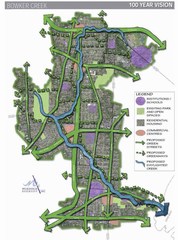BOWKER CREEK BLUEPRINT: Water Bucket stories profile precedent-setting initiative for urban watershed restoration in the Georgia Basin
About the Bowker Creek Blueprint
Major breakthroughs happen when decision makers in government work with grass-roots visionaries in the community to create desired outcomes. This is the essence of the Bowker Creek story.
The Bowker Creek watershed is located in the urban heartland of British Columbia’s Capital Regional District on southern Vancouver Island.
Established in 2004, the Bowker Creek Urban Watershed Renewal Initiative (BCI) is precedent-setting. This unique multi-jurisdictional effort brought together local governments, community groups, post-secondary institutions and private citizens.
100-Year Action Plan for Watershed Restoration
The BCI demonstrates how to apply a ‘regional team approach’ to urban watershed restoration in the Georgia Basin. The players driving the BCI have brought their shared vision to fruition through development of the Bowker Creek Blueprint. This is a 100-Year Action Plan to improve Bowker Creek and its watershed.
 The Bowker Creek Blueprint provides member municipalities, the Capital Regional District, the community and other land stewards with information and guidance to manage and restore the Bowker Creek watershed and creek corridor over the long term.
The Bowker Creek Blueprint provides member municipalities, the Capital Regional District, the community and other land stewards with information and guidance to manage and restore the Bowker Creek watershed and creek corridor over the long term.
“Having a plan in place will ensure that positive changes can happen incrementally, and that opportunities for major improvements can be achieved as they arise…in order to achieve the Bowker Creek Vision,” states Tanis Gower, BCI Coordinator.
 “Change is slow in the urban environment. It usually happens with re-development of individual lots as buildings wear out or as population density increases. With re-development comes opportunity for creek restoration or creek day-lighting (opening buried sections). However, since restoration opportunities happen on a lot-by-lot basis over time, a long term plan and policies need to be in place.”
“Change is slow in the urban environment. It usually happens with re-development of individual lots as buildings wear out or as population density increases. With re-development comes opportunity for creek restoration or creek day-lighting (opening buried sections). However, since restoration opportunities happen on a lot-by-lot basis over time, a long term plan and policies need to be in place.”
“The Bowker Creek Initiative has produced a plan – the Bowker Creek Blueprint – that includes policy recommendations. Creek restoration opportunities typically arise with little warning, and the detailed plan and long-term vision will help all its partners be ready.”
The Bowker Creek Forum
The Bowker Creek Forum on February 23, 2010 was a celebration of the Bowker Creek Blueprint. Because the Blueprint accomplishment is of provincial significance, the Forum was also an opportunity for inter-regional learning.
Water Bucket Series of Stories
Leading up to the Bowker Creek Forum, a set of four stories progressively foreshadowed and/or elaborated on what would be covered at the Forum. A fifth story documents the Forum outcomes To download PDF copies of these stories, click on the links below:
Story #1 titled Convening for Action in the Georgia Basin: Bowker Creek Blueprint establishes precedent for moving from awareness to actiondescribes the Bowker Creek Blueprint, summarizes the process that culminated in the 100-Year Action Plan, and synthesizes lessons learned.
Story #2 titled Convening for Action in the Georgia Basin: Bowker Creek Forum promotes inter-regional sharing and collaboration introduces the vision for collaboration among the three regions (Capital Region, north of the Malahat, Metro Vancouver); and describes the ‘regional team approach’ to achieving water sustainability through implementation of green infrastructure.
Story #3 titled Shared Responsibility: Community Perspectives on Developing and Implementing the 100-Year Action Plan for Watershed Restoration described the role played by community groups and associations; and explainws how community values influenced the plan development process and are reflected in the Bowker Creek Blueprint.
Story #4 titled Shared Responsibility: Local Government Perspectives on Developing and Implementing the 100-Year Action Plan for Watershed Restoration elaborated on what on-the-ground implementation will mean for municipal staffs which are tasked with making things happen.
Story #5 titled Call to Action: Bowker Creek Forum advances a ‘regional team approach’ in the Georgia Basin summarizes what was accomplished by the Forum, and foreshadows where the outcomes may lead.
“These stories served as resource materials for participants; and in future will serve as a publicly accessible record of the Forum process,” states Kim Stephens, Program Coordinator for the Water Sustainability Action Plan for British Columbia.



